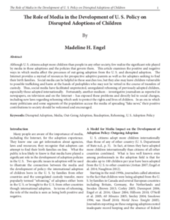Abstract
Although U. S. citizens adopt more children than people in any other society, few realize the significant role played by media in these adoptions and the policies that govern them. This article examines the positive and negative ways in which media affect the processes of out-going adoption from the U. S. and disrupted adoption. The Internet provides a myriad of resources for prospective adoptive parents as well as for adoptees seeking to find their birth families. Social media can be helpful in these searches too, but they also may leave children vulnerable to possible trafficking and harm at the hands of pedophiles who may not be vetted in the course of transfers of custody. Thus, social media have facilitated unprotected, unregulated rehoming of previously adopted children, especially those adopted internationally. Fortunately, another medium – investigative journalism as reported in newspapers, on television and on the Internet – has exposed these problems and directly led to social changes, including new laws regarding rehoming which seek to protect the rights and lives of children. In an era in which many politicians and some segments of the population accuse the media of spreading “fake news,” their positive contributions to society should be welcomed and encouraged.

